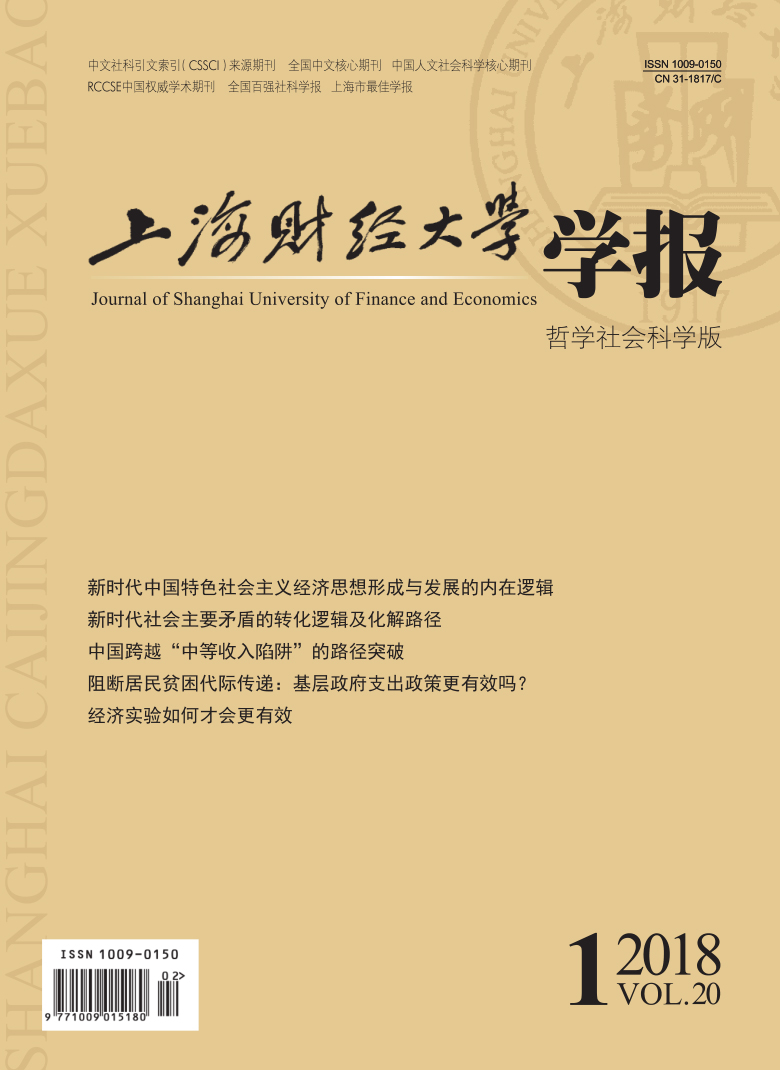教育是家庭和个体阶层流动的重要渠道,也是一国人力资本积累的重要途径。伴随经济社会转型,重组家庭规模不断增加,而家庭结构变动对子女受教育影响的定量研究却付之阙如。文章首次采用CHARLS(2014)微观数据研究了家庭重组对子女受教育水平的影响。结果显示:(1)与完整家庭相比,重组家庭子女受教育水平降低约12.18%–15.5%,父母较高的受教育水平可以减缓但并不能消除这种差异。(2)家庭重组对男女存在显著差异,其中男、女受教育水平分别下降约14.26%和7.44%。(3)文章进一步从重组家庭的组合类型研究了性别差异背后的原因,发现与生父继母型家庭相比,生母继父型家庭使得男孩的受教育水平降低约24.21%;但对女孩而言,家庭重组类型并不存在显著差异。研究结果表明,在讨论未成年人受教育水平问题时,需要更加关注家庭结构和重组类型所产生的影响。
家庭重组降低了子女受教育水平吗?——基于CHARLS的经验证据
摘要
参考文献
1 陈建伟. 教育的婚姻回报: " 学得好”与" 嫁得好”[J]. 上海财经大学学报, 2015, (6).
2 陈强. 高级计量经济学及Stata应用[M] . 北京: 高等教育出版社, 2010.
3 杜亚松, 唐慧琴, 包玉娟, 等. 十类特殊家庭子女心理卫生状况的研究[J]. 中国心理卫生杂志, 2002, (1).
6 江金薇. 流动重组家庭儿童心理问题个案工作介入研究[D]. 武汉: 华中科技大学, 2015.
8 廖北文. 大学生心理健康与主观幸福感的相关研究[J]. 衡阳师范学院学报, 2008, (1).
12 尚昀, 臧旭恒. 家庭资产、人力资本与城镇居民消费行为[J]. 东岳论丛, 2016, (4).
14 唐丹丹. 冲突适应的性别差异[J]. 心理技术与应用, 2016, (7).
15 童铃. 论继父母子女关系[D]. 上海: 华东政法大学, 2010.
27 张光宏, 李杰. 我国城乡家庭教育投资能力比较分析[J]. 农业技术经济, 2011, (11).
28 张苏, 曾庆宝. 教育的人力资本代际传递效应述评[J]. 经济学动态, 2011, (8).
33 Amato P R. The impact of family formation change on the cognitive, social, and emotional well-being of the next generation[J]. Future of Children, 2005, 15(2):75–96. DOI:10.1353/foc.2005.0012
34 Aquilino W S. Family structure and home-leaving: A further specification of the relationship[J]. Journal of Marriage and Family, 1991, 53(4): 999–1010. DOI:10.2307/353003
35 Becker G S, Tomes N. Human capital and the rise and fall of families[J]. Journal of Labor Economics, 1969, 4(3 Pt 2): 1–47.
36 Bray J H, Hetherington E M. Families in transition: Introduction and overview[J]. Journal of Family Psychology, 1993, 7(1): 3–8. DOI:10.1037/0893-3200.7.1.3
37 Brown A C, Green R J, Druckman J. A comparison of stepfamilies with and without child-focused problems[J]. The American Journal of Orthopsychiatry, 1990, 60(4): 556–566. DOI:10.1037/h0079208
38 Cherlin A J, Furstenberg Jr F F. Stepfamilies in the United States: A reconsideration[J]. Annual Review of Sociology, 1994, 20: 359–381. DOI:10.1146/annurev.so.20.080194.002043
39 Deolalikar A, Rose E. Gender and savings in rural India[J]. Journal of Population Economics, 1998, 11(4): 453–470. DOI:10.1007/s001480050079
40 Fine M A, Kurdek L A. The adjustment of adolescents in stepfather and stepmother families[J]. Journal of Marriage and Family, 1992, 54(4): 725–736. DOI:10.2307/353156
41 Fine M A, Kurdek L A. Relation between marital quality and(step)parent-child relationship quality for parents and stepparents in stepfamilies[J]. Journal of Family Psychology, 1995, 9(2): 216–223. DOI:10.1037/0893-3200.9.2.216
42 Furstenberg Jr F F. Divorce and the American family[J]. Annual Review of Sociology, 1990, 16: 379–403. DOI:10.1146/annurev.so.16.080190.002115
43 Jeynes W H. Effects of remarriage following divorce on the academic achievement of children[J]. Journal of Youth and Adolescence, 1999, 28(3): 385–393. DOI:10.1023/A:1021641112640
44 Kirby J B. From single-parent families to stepfamilies: Is the transition associated with adolescent alcohol initiation? [J]. Journal of Family Issues, 2006, 27(5): 685–711. DOI:10.1177/0192513X05284855
45 Pasley K, Koch M G, Ihinger-Tallman M. Problems in remarriage[J]. Journal of Divorce&Remarriage, 1994, 20(1–2): 63–83.
46 Reading R. Maternal and child undernutrition 5: Effective international action against undernutrition: Why has it proven so difficult and what can be done to accelerate progress? [J]. Child: Care, Health and Development, 2008, 34(3): 405–407.
47 Schrodt P. Sex differences in stepchildren’s reports of stepfamily functioning[J]. Communication Reports, 2008, 21(1): 46–58. DOI:10.1080/08934210802019462
48 Schultz T W. Investment in human capital[J]. The American Economic Review, 1961, 51(1): 1–17.
49 Shafer K, Jensen T M, Holmes E K. Divorce stress, stepfamily stress, and depression among emerging adult stepchildren[J]. Journal of Child and Family Studies, 2017, 26(3): 851–862. DOI:10.1007/s10826-016-0617-0
50 Shrifter M R. Adjustment to parental divorce and remarriage: An examination of the impact of gender and temperament in children[J]. Ethiopian Journal of Health Development, 2007,22(22): 1–34.
51 Thomson E, Mclanahan S S. Reflections on " family structure and child well-being: Economic resources vs. parental socialization”[J]. Social Forces, 2012, 91(1): 45–53. DOI:10.1093/sf/sos119
52 Zvoch K. Family type and investment in education: A comparison of genetic and stepparent families[J]. Evolution and Human Behavior, 1999, 20(6): 453–464. DOI:10.1016/S1090-5138(99)00024-0
引用本文
丁从明, 张培莹. 家庭重组降低了子女受教育水平吗?——基于CHARLS的经验证据[J]. 上海财经大学学报, 2018, 20(1): 102–113.
导出参考文献,格式为:
上一篇:本期导读





 11462
11462  14218
14218

